
by Steve | Jun 22, 2020 | In the News, Perspective E-Newsletter
By Thomas Lambrecht –

Photo by Fauxels via Pexels.com
“Accountability” is one of the key watchwords of our contemporary era. Greater accountability is being demanded of politicians, police officers, and other public servants. How do we in the civilian arena hold those with power and position to the high standard of honesty, integrity, and justice? What powers and responsibilities should civilian review boards have? What does it mean when millions of citizens feel the need to march in protest to make their point?
Ironically, similar questions arise when it comes to the accountability of our United Methodist Church leaders and bishops. Lay people and concerned clergy are often befuddled when church leaders and bishops sometimes violate the Book of Discipline or fail to enforce it. Observers have a point when asking if the “clergy union” sometimes obstructs accountability. It is correct to ask what powers and responsibilities should committees on investigation or trial courts have? How can we ensure bishops pursue the “just resolution” process with integrity?
The primary reason The United Methodist Church is on the verge of separation is the lack of accountability in some parts of the church. We have always had differences of opinion around issues such as the definition of marriage and the boundaries of human sexuality. But over the past eight years, we have had unprecedented levels of actual disobedience to the standards set by our church’s General Conference, the only body that can set those standards for the whole church. And such disobedience has often been ignored, accommodated, or even praised by some church leaders and bishops. The actions of the 2019 St. Louis General Conference were an attempt to restore and enhance accountability to the church’s standards.
Without accountability to agreed-upon standards, there are no boundaries to human behavior. Without boundaries, there is chaos. Regrettably, riots are not the only sign of chaos. Tragically, the chaos of boundary-less behavior goes on every day at a lower intensity in our society, seen not only in racist incidents, but marital infidelity, tax cheating, bullying, abuse of others, and many other manifestations of human brokenness.
Of course, we are much better at demanding accountability for someone else, than we are at demanding it of ourselves. It is much easier to clamor for accountability for public figures than for us to hold ourselves accountable for our own racist thoughts, words, and actions. How often have we thought, “Accountability for others is prophetic preaching; accountability for me is meddling!”
And that is where human brokenness meets the Gospel of Jesus Christ. “All have sinned and fall short of God’s glorious standard” — including me. “There is no one righteous, not one.” Every one of us needs a Savior, for we cannot save ourselves, nor can we live up to the expectations and dreams God has for us.
“God demonstrates his own love for us in this: While we were still sinners, Christ died for us.” Jesus came to redeem sinners, mend brokenness, reconcile relationships, reform attitudes, and change hearts and minds. None of these things can we do on our own. It is only the grace of God working by the power of the Holy Spirit that can transform the world, one soul at a time.
That is the urgent need of this moment. As we rightly speak out against racism and inequity and work for justice and accountability, we acknowledge the impossibility of lasting change without the Spirit of God working in and through us. We can (and should) do what we can do, but until God does what only God can do, the world will stay the same. We work in hope and expectation because we know God is already at work, using the tragedies and brokenness of our time to soften hearts and create changed lives and new systems that tend toward righteousness, rather than exploitation.
This is where accountability returns to the picture. Initial accountability awakens in us the awareness of our need for a Savior. Once we have turned to him and received forgiveness and new life, our need for accountability continues. This Christian accountability, however, leads not to judgment and condemnation, but to sanctification and growing maturity in love. It has a “positive” rather than a “negative” purpose.
“Negative” accountability is when the doctor tells me that I am out of shape, overweight, and headed toward health problems unless I do something about it. “Positive” accountability is when I join the gym and start working with a trainer who holds me accountable to daily and weekly fitness goals. The first accountability shows me the need for change in my life. The second accountability supports me in actually making that change in a sustainable way.
This is the DNA of Methodism, that we would “watch over one another in love.” That we would invite others to hold us accountable, not in a judgmental way, but in a supportive way, helping us to actualize the life of love to which Jesus calls us. The early Methodist class meetings, small groups of about a dozen people, met to share with each other “how it is with my soul.” Not so that I could prove that I am more spiritual than you are. Not so you could look down on me for the pitiful state of my soul. But so that together we can encourage and support one another on the journey toward living in perfect love with God and others.
The Christian life is not easy. Becoming conformed to the likeness of Jesus Christ is challenging and painful. We should not expect to do it alone. I am much less likely to skip a day at the gym when I know my trainer is going to ask me next week how many times I worked out. In the same way, I am much more likely to keep striving to live a Christlike life when I know I will have to answer those questions in my next small group meeting, “How is it with your soul? How did your life reflect Christ’s love this week? What challenges did you face in striving to live for Jesus?”
Accountability for others is important, and we should work to make our society more just and fair. But accountability for ourselves prepares us for an eternity with God and helps us to be a channel for Jesus’ transforming grace in this life. Let’s find a way to gather the support, encouragement, and accountability we need to sustain us on this journey.
Thomas Lambrecht is a United Methodist clergyperson and the vice president of Good News.

by Steve | Jun 12, 2020 | In the News, Perspective E-Newsletter

The Crossing of the Red Sea by Nicolas Poussin (1633-34)
By Thomas Lambrecht –
Winston Churchill is alleged to have remarked, “never waste a crisis.” It has long been said that the Chinese characters for the word “crisis” signify both danger and opportunity. If we focus too much on the danger, we can miss the opportunity that is hidden within the crisis.
The process of change and growth is most often a slow, steady process — discussed in Eugene Peterson’s book entitled A Long Obedience in the Same Direction. But this steady process is often punctuated by singular events that bring dramatic change and growth in a short time. When our grandchildren come to visit us for a week, we often note a significant jump in their vocabulary, their ability to walk, or other forms of growth. A crisis can shake up the status quo in a way that encourages change and allows new growth that would not otherwise happen.
Key events in the Bible represented crisis times that brought about dramatic change and growth. Moses and the people of Israel were trapped between the Egyptian army and the Red Sea. God parted the waters and the people began their journey as a new nation formed by the Exodus. The Philistines killed Israel’s first king, Saul, and his sons, threatening to enslave Israel once again. God anointed David as king and empowered him to lead Israel to victory over their enemies and to the greatest expansion of Israel’s borders, power, and wealth in their history. The Assyrians had captured nearly every town in Israel and surrounded Jerusalem with their mighty army. King Hezekiah prayed and God destroyed the Assyrian army by putting 185,000 men to death, perhaps by a plague.
In the New Testament, the biggest crisis of all occurred when the Son of God was humiliated and put to death on a cross outside Jerusalem. Three days later, God raised Jesus from the dead and changed human history forever. Fifty days later the Church was born on Pentecost with the gift of the Holy Spirit and the conversion of over 3,000 people.
Each of these crisis moments posed a real, existential danger to God’s people. And in each instance God intervened to bring about a miraculous turnaround that transformed God’s people and changed history.
We may be at such a crisis point right now. In fact, we are beset by a health crisis with the Coronavirus pandemic, an economic crisis with the worst downturn since the Great Depression, and a societal crisis in coming to grips with the evil of racism. Any one of these crises would be challenging enough to deal with on its own. Addressing all three crises at the same time puts us in a situation of “biblical proportions,” like the examples cited above.
We can count on the fact that God is with us in the midst of these crises. Not only that, but God is ready to act on our behalf in the midst of these crises. As Moses encouraged the Israelites on the shores of the Red Sea, “Do not be afraid. Stand firm and you will see the deliverance the Lord will bring you today. … The Lord will fight for you; you need only to be still” (Exodus 14:13-14). We can look first and foremost to what God is doing in the midst of our crisis. Through prayer we can relinquish our need to be in control and allow ourselves to rest in God’s presence and the assurance of his activity on our behalf.
But there is also a role for us to play. When God parted the waters, the people walked through the Red Sea. When God proclaimed David king, the people acknowledged his authority and the army went out to fight the enemy. When Jesus rose from death, the first disciples told the story and proclaimed God’s salvation. As Henry Blackaby (Experiencing God) puts it, we need to discern what God is doing and join him in his work.
So churches have been feeding the hungry, paying rent and utilities for people who have been laid off, and ministering to those suffering illness or grieving loss. We have been learning how to worship at a distance or online and how to maintain relationships via Zoom and phone calls. We have become vividly aware of unjust deaths and hateful prejudice in our midst and even perhaps in our own hearts.
Here is where the opportunity of our crisis comes. We are learning to do church in new ways. We are learning to use new tools to reach people with the love of Christ. We are learning new behaviors and ways to understand the experiences of our black and brown sisters and brothers as we have not understood them before.
When the crisis is past, we could just try to return to “the way things used to be.” There is a certain nostalgia and attraction for the familiar. The Israelites often longed to return to Egypt, forgetting that there was slavery. We must resist that siren call of the past.
Instead, we can incorporate what we have learned and the ways we have grown in the crisis to envision a new way to do and be church. The Rev. Tom Berlin, an influential pastor in Virginia, calls it “hybrid church.” Even when we return to doing some of the things we used to do, we can also keep doing some of the new things we have learned how to do. Regeneration Ministries in Maryland has found that by taking their ministry online, they are able to reach people across the country and around the world with the love, healing, and transformation of Jesus. Our ability to reach people can grow exponentially as we incorporate new strategies.
And we can be a church that treats one another with love and equal justice in new ways. We can learn to listen to understand, rather than simply react when people share their perspective that differs from our own. We can step back from being defensive and engage in a constructive way with the pain of people of color who have experienced racism in great and small ways. We can react positively and embrace the opportunity when the bishop wants to appoint a woman or a person of color as our pastor. We can speak up for reform of our justice system to increase accountability for law enforcement and focus on treatment and rehabilitation of nonviolent offenders, rather than locking them up in prison. Instead of continuing as a denomination that is 95 percent white in the United States, we can intentionally and aggressively seek to build ministry in the ethnic communities that will soon make up a majority of our country’s population.
The English word “crisis” comes from the Greek krisis (decision) from the Greek krinein (to decide). A crisis presents us with decisions to make. Will we hunker down and resist change and adaptation, hanging on to the way things used to be? Or, as orthodox Christians, will we embrace the opportunity to do and be the church in the new ways demanded by our changing times? Assured of God’s presence, his activity on our behalf, and his guidance, we can step out in faith to be followers of Jesus Christ in a new path.
Thomas Lambrecht is a United Methodist clergyperson and the vice president of Good News.

by Steve | Jun 8, 2020 | In the News, Perspective E-Newsletter
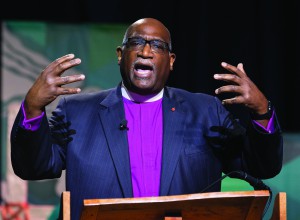
Bishop Gregory V. Palmer delivers the episcopal address during the 2016 United Methodist General Conference in Portland, Oregon. Photo by Mike DuBose, UMNS.
“What a season we have been through and what a week we are in,” wrote Bishop Gregory V. Palmer of the West Ohio Annual Conference. “The angst and pain are palpable. I need you to know I share that pain and I see me in some way shape or form every time I see video clips from Minneapolis and around the country. I have no illusion. It could have been me. That’s the world in which we live.
“The death of George Floyd is a painful sequel to much that we have seen before,” Palmer continued. “God help us if you please. I grieve for the Floyd family and all the families that have had the same or similar experience. God heal their hearts. I shudder as I watch the burning in Minneapolis, but I do watch and choose not to look away. Looking away perpetuates avoidance. I look not to condone but to be drawn deeper into the compassionate heart of Jesus our savior. Lord give us eyes to see.” (His entire message is found HERE.)
Within our society and around the world, the horrific deaths of George Floyd, Breonna Taylor, and Ahmaud Arbery have sparked passionate protest, intense soul-searching, and purposeful prayer. At this time, Christians are looking for ways to be a faithful witness to the Gospel of our Lord Jesus and his kingdom of compassion, righteousness, and justice.
Our national, state, and local leaders are in need of great wisdom at this time. This also goes for the leaders of The United Methodist Church. Local pastors are in need of prayer, as are our bishops. Here are statements from four bishops that may help you think, pray, and respond with greater spiritual insight.
* Bishop Sharma Lewis, Virginia
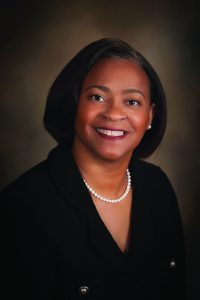
Bishop Sharma Lewis
“When do we as children of God decide that God is calling us into action? When do we decide that mere words or social media interactions for a few days are just not enough?
“When do we as children of God decide that the systemic racism in our society, whether manifested overtly or covertly, is a sin that hinders our relationship with Jesus Christ and is antithetical to the gospel?”
https://vaumc.org/bishop-lewis-calls-for-action-against-systemic-racism/
* Bishop Bruce R. Ough, Dakotas-Minnesota
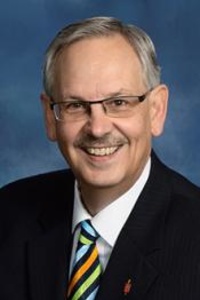
Bishop Bruce R. Ough
“Now, it is our responsibility as persons of faith, and particularly as followers of Jesus in the Methodist tradition, to address this pervasive pandemic of racism. We are compelled to address this pandemic with the same intensity and intentionality with which we are addressing COVID-19.
“We begin by acknowledging that racism is sin and antithetical to the gospel. We confess and denounce our own complicity. We take a stand against any and all expressions of racism and white supremacy, beginning with the racial, cultural, and class disparities in our state and country that are highlighted by the coronavirus pandemic.”
https://www.unitedmethodistbishops.org/newsdetail/pandemic-of-racism-14011039
* Bishop Jonathan Holston, South Carolina
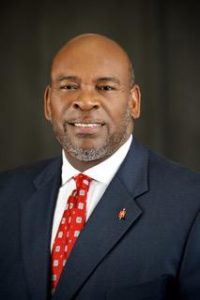
Bishop Jonathan Holston
“As United Methodists and followers of Christ, we commit ourselves to social justice and to opposing racism in all of its forms. We encourage frank and thoughtful conversation and respectful collaboration with a common goal of justice for all. It is our obligation to be a beacon of love when hatred threatens to blot out the light of hope.”
https://www.umcsc.org/bishop-holston-seeks-pentecost-prayers-for-justice-and-peace-amid-racial-tension-unrest/
Bishop Holston wrote in a later statement, “When we witness inexplicable injustice, anger is understandable, protest is appropriate, and action is vital. Violence and destruction, though, is never the answer.
“We are encouraged to see people flood the streets to peacefully call for justice and an end to oppression. This is faith in action – the bedrock of our commitment to social justice as United Methodists and followers of Christ.”
https://www.umcsc.org/bishop-holstons-statement-on-violence-following-peaceful-s-c-protests-of-george-floyd-killing/
* Bishop Frank Beard, Illinois Great Rivers
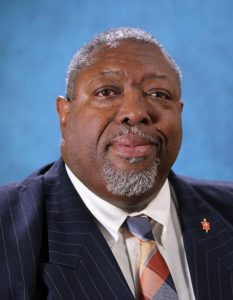
Bishop Frank J. Beard
“It is the job of every Christian to serve as conduits of grace, mercy, and love so that the dark forces of our world might experience the liberating light of Jesus Christ. It is our job to help stamp out hatred in any form. Therefore, I encourage all United Methodist to pray for the families that are affected by this most recent tragedy, as well as those suffering a similar plight in recent months. I remind us all that it is our duty, as sisters and brothers, to stand-up, speak-out, and advocate for those that are hurting and marginalized, so that justice may become a reality.”
https://www.igrc.org/blogpostsdetail/14010915
In a separate statement, Bishop Beard offered practical suggestions as we wrestle with the issues of race, prejudice, and injustice.
“Dealing with racism is not easy and it takes a lot of energy and forethought that will often move us into uncomfortable places. Speaking up and out is important, even though people often are scared to say anything because they worry that if they say the wrong thing, they might get in trouble or find themselves being labeled. It is crucial for Christians to create safe sanctuaries where we can have difficult conversations about racism and other topics that promote injustice.”
Beard offered 10 ways that Christians can begin to “address systemic injustice and discrimination.”
- Becoming aware of policies and practices that promote disparities based on race, ethnicity, stereotypes, or economic status.
- By employing the use of empathetic listening that is engaging and helps with validating the feelings and personal experiences of persons of color, without being dismissive or making explanatory comments that seek to rationalize or soothe away their pain.
- Learn to recognize and understand your own privilege and experiences that are based on skin color and power.
- Share your own story as you engage in tough conversations about race and injustice. Your story will help foster deeper understanding for you and for others as you interact together.
- Recognize that America is NOT a “melting pot” but rather a “garden salad” containing a blend of unique colors and flavors meant to be experienced together. DO Not give in to the myth that you must be “color blind.”
- Seek to identify with those that are marginalized and who face the effects of a system that thrives and survives on racist behavior and practices.
- Use the power of your own personal finances by taking a stand with your money. Be aware of the practices of those you do business with.
- Create safe places for difficult conversations, utilizing people experienced in providing diversity training.
- Develop and foster relationships with people of color based on mutual respect and concern for each other’s well-being.
- As people of faith, pray for and with others, that Jesus’ prayer for unity would become a reality.
https://www.igrc.org/blogpostsdetail/simple-strategic-steps-christians-seeking-to-do-something-significant-14014492

by Steve | Jun 1, 2020 | In the News, Perspective E-Newsletter
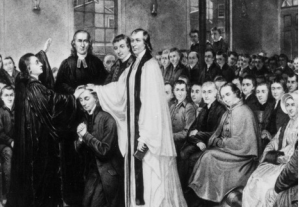
An engraving of an 1882 painting recreating Asbury’s ordination as bishop at the 1784 Christmas Conference.
By Thomas Lambrecht –
“Conferencing” is at the heart of Methodist history and tradition. In 1744, only a few years after starting the Methodist movement, John Wesley called together the small group of preachers who formed the core of the movement for a “conference” meeting. They gathered to discern “how we should proceed to save our own souls and those that heard us.” Their agenda was simple, but comprehensive: “1. What to teach, 2. How to teach, and 3. What to do, that is, how to regulate our doctrine, discipline, and practice.”
Ever since, the “conference” has been part and parcel of how Methodists do church. The 1744 conference became an annual affair, a gathering of all the preachers (lay and clergy) who were “in connexion” with John Wesley. Thus, the “annual conference” became the center of Methodist organization. As the church was formed in America and grew, the number of annual conferences multiplied, covering different geographical parts of the country, and later, of the world. Each annual conference formed a geographical section of the general church. To maintain unity, a General Conference consisted of representatives from all the various annual conferences, making decisions on behalf of the whole church. When the church was broken up into regions in 1939, those bodies were called jurisdictional conferences and later central conferences (i.e., jurisdictions outside the U.S.), for the purpose of electing and assigning bishops. Within each annual conference, there are sub-regions called districts that have a “district conference.” And of course the basic building block of the denomination is the local “church conference” or “charge conference.”
Conferences are far more than geographical organizational units. They represent the intuitive genius of Wesley’s organizational mind that identified collective decision-making as an essential component of church structure. Many Protestant denominations in Wesley’s time were governed by irregularly meeting synods or councils that would gather only when necessary. Wesley saw the strength to be gained by collective decision-making by a body of people that is held in constant relationship and mutual accountability.
The idea of collective decision-making was instituted early in the Church’s history, at the Council of Jerusalem (Acts 15), which was called to decide whether Gentile converts must be circumcised and required to follow the Law of Moses. Such collective decision-making allows the Holy Spirit to speak through the diversity of voices who are part of the collective. Reaching agreement among a broad group of leaders often results in a more faithful decision and one that is able to consider more of the ramifications of that decision. It has the added benefit of gaining “buy-in” from the same group of leaders that will have to implement the decisions that are made.
The Wesleyan Covenant Association (WCA) has just released Part Seven of its draft Book of Doctrines and Discipline, addressing the role of annual, regional, and general conferences in a new global traditional Methodist denomination. Additional provisions about conferences may be found in the proposed Constitution, ¶203, Articles VI-VIII, that was previously released. Sections previously released may be reviewed on our website resource page here.
As the WCA considered the wisdom of retaining our conferencing system of decision-making and organization, we also realized the current United Methodist system had strayed off the path in a number of ways that need to be corrected if Methodism is to recover its vitality.
First, the UM system has reversed the hierarchy in an unhelpful way. The annual conference and General Conference were instituted as means to support and empower the work of the local church, which is (we say) “the most significant arena through which disciple-making occurs.” Instead, in recent years, it seems like the local church has existed to support the work of the annual and General Conference. In its reformation of the conference system, the WCA strives to make crystal clear that conferences exist to support the local church, not the other way around.
Second, and relatedly, the annual and General Conferences have grown too large in structure and demand too many resources. The “needs” of ministry at the regional and global levels siphon off too much time and financial resources from local churches, which then weakens the local ministry rather than strengthens it. This is seen in the amount of time pastors spend on annual conference business outside their parish and bishops spend on global church business outside their annual conferences. Many local churches do not see the value to them of the work that annual conference and general church agencies do “on their behalf.”
Accordingly, the WCA’s proposal calls for a lean annual conference structure demanding lower apportionments and less time investment in bureaucracy and meetings, with more time and financial investment in work that explicitly supports the ministry of local churches, including the aggressive planting of new congregations. Bishops and district superintendents are relieved of many of their administrative responsibilities and expected to focus their time and energy within their districts and annual conferences, while still building connections to the worldwide church based on mutual ministry, rather than meetings (see Part Six of the draft Book of Doctrines and Discipline.)
The general church would have only five agencies (called “commissions”) to handle the coordinating and facilitating work of the denomination. (More details on these commissions are found in Part Eight of the WCA’s draft “Book of Doctrines and Discipline” which will be released soon.) The annual conference would have only four required boards or committees to facilitate its work. (It could form more as needed.) The emphasis is really on reducing the amount of structure and reorienting the work of the annual conference and general church to support the local church’s ministry.
Third, as the church has grown over the last 100 years, its Book of Discipline has gotten too prescriptive and controlling, with all kinds of mandates and requirements that often hamper the work of the local church. The current Discipline is 819 pages (not including the index). I have a 1926 Discipline that is only half that size and includes worship rituals, judicial decisions, a description of the course of study, and a directory!
Accordingly, the WCA proposal allows annual conferences to structure themselves in a way that makes sense for them, aside from the minimal requirements for four agencies. This will allow conferences to stay lean in structure, yet nimble enough to adapt to changing circumstances. It will also allow for cultural differences in various parts of the world to be reflected in variations of structure and process. At the same time, nearly all the provisions in the draft “Book of Doctrines and Discipline” would meet the needs and requirements in conferences around the world. The WCA has worked to craft a book that would apply equally well in Bulgaria, the Philippines, the U.S., or Zimbabwe. This will allow for greater uniformity on the essential matters, while allowing flexibility in many other matters.
Finally, in an effort to take the focus of the church off of the (sometimes contentious) General Conference, the WCA proposal in ¶ 203 (Article VI) of the draft “Book of Doctrines and Discipline,” envisions General Conference meeting only once every six years, instead of quadrennially. For the first six years, it would meet every two years in order to fine tune the general church’s core teachings and governance structure as we live into a new reality. But thereafter, General Conference will be reserved for making the larger policy decisions and letting annual conferences and local churches focus on their ministry.
The WCA’s proposals are just that — proposals. They will be presented as legislation to the convening conference of a new global traditional Methodist church. We hope you will consider them and give constructive feedback as we compile ideas to guide the formation of a new Methodist denomination that focuses both on biblical faithfulness and on ministry effectiveness and fruitfulness.
Thomas Lambrecht is a United Methodist clergyperson and the vice president of Good News.

by Steve | May 22, 2020 | In the News, Perspective E-Newsletter
By Thomas Lambrecht –

The Rev. Nicky Gumbel leads Holy Trinity Brompton church in London, home of The Alpha Course. Photo: Holy Trinity Brompton
In times of crisis, people often turn to God. There is some anecdotal evidence that is happening now with the coronavirus pandemic.
Bible downloads in Google Play and App Store exceeded 2 million in March, the highest total ever for the month. Attendance at the on-line Alpha Course doubled at Holy Trinity Brompton Church in London, one of the largest churches in England. (That course — now taken by an estimated 23 million people around the globe — enables non-Christians to ask questions about faith and Christianity.)
A survey found that 44 percent of respondents believe that the pandemic and the resulting economic meltdown is a wake-up call for us to turn back to God or a sign of coming judgment. The same survey found that over 20 percent of non-Christians reported that they have responded to the crisis by starting to read the Bible, listening to sermons or Bible teachings, or engaging in conversations about spiritual things.
When a crisis hits, many people turn to engage the big, existential questions of life: Why am I here? Who am I really? Is there a God? What will happen to me when I die?
Churches have the unique opportunity to point people to the answers to these kinds of questions and to walk with them during a time of discovery and spiritual growth. God can use crises like this one to influence the spiritual life of a whole generation.
Churches are to be commended for the ways they are reaching out and serving their communities through making and distributing masks, providing food, helping people pay the rent, and serving immigrant communities in the U.S. and the needs of the poor around the world. These practical ways of helping people survive in the midst of the health and economic crises are an essential work of the church. God gives us what we have, so that we can be a blessing to others.
At the same time, Christian teaching compels us to not only provide for the physical needs of people but for their spiritual needs, as well. The church can speak to the existential questions of life like no others can. Through faith in Christ, we have the answers to who we are, why we are here, and what our future entails. God has specially equipped the church to truly feed the soul.
In the midst of the death, illness, and hardship of our times, we can offer an eternal perspective that transcends our earthly travails.
I was reminded of this by Dr. Kevin Watson’s recent summary of Charles Wesley’s sermon, “Awake, Thou That Sleepest.” He points out that one of Wesley’s main points is this earth is not our permanent place. “This is not thy home,” Wesley says. “Think not of building tabernacles here. Thou art but ‘a stranger, a sojourner upon earth’; a creature of a day, but just launching out into an unchangeable state. Make haste; eternity is at hand” (II.5).
Having that eternal perspective changes how we view and how we cope with the ups and downs of everyday life, including this unforeseen pandemic. We realize that we are not just living for the present, but for eternity. The trials and difficulties of life are overshadowed by the promised joys of an eternity lived in fellowship with the Lord. We look forward to the time when “God’s dwelling place is now among the people, and he will dwell with them. They will be his people, and God himself will be with them and be their God. He will wipe every tear from their eyes. There will be no more death or mourning or crying or pain” (Revelation 21:3-4).

Ravi Zacharias (Ben May/Ravi Zacharias International Ministries)
We learned this week of the passing into eternal life of Ravi Zacharias, a prominent evangelist and expert in apologetics from India. His 48-year global ministry touched countless lives, and his 27 books continue to share his message about his Savior, Jesus Christ.
Ravi’s eternal perspective is summed up in a hymn written by the New England Puritan, Richard Baxter (1615-1691), that Ravi quoted just weeks before his unexpected death:
Lord, it belongs not to my care
Whether I die or live;
To love and serve Thee is my share,
And this Thy grace must give.
If life be long, I will be glad
That I may long obey;
If short, yet why should I be sad
To welcome endless day?
Christ leads me through no darker rooms
Than He went through before;
He that unto God’s kingdom comes
Must enter by this door.
Come Lord, when grace hath made me meet
Thy blessed face to see;
For if Thy work on earth be sweet
What will thy glory be!
Then I shall end my sad complaints
And weary sinful days,
And join with the triumphant saints
That sing my Savior’s praise.
My knowledge of that life is small,
The eye of faith is dim;
But ’tis enough that Christ knows all,
And I shall be with Him.
As we labor hard to serve the needs of others during this pandemic and recession, we are simultaneously reminded to turn our eyes and the eyes of those we serve to heaven, to eternity, and to the Lord. The church is uniquely positioned to lift up the One who said, “I am the resurrection and the life. The one who believes in me will live, even though they die; and the one who lives by believing in me will never die” (John 11:25-26).
Jesus asked Martha, “Do you believe this?”
Do we? Do we live it?
Living with an eye on eternity changes everything. We can winsomely share Christ with others who are seeking him now without knowing what or whom they seek. His presence will give meaning to their lives as it does to ours, and it gives us the strength and the courage to face the challenges of each new day. By faith we can say, “It is enough that Christ knows all, and I shall be with Him.”
Thomas Lambrecht is a United Methodist clergyperson and the vice president of Good News.











